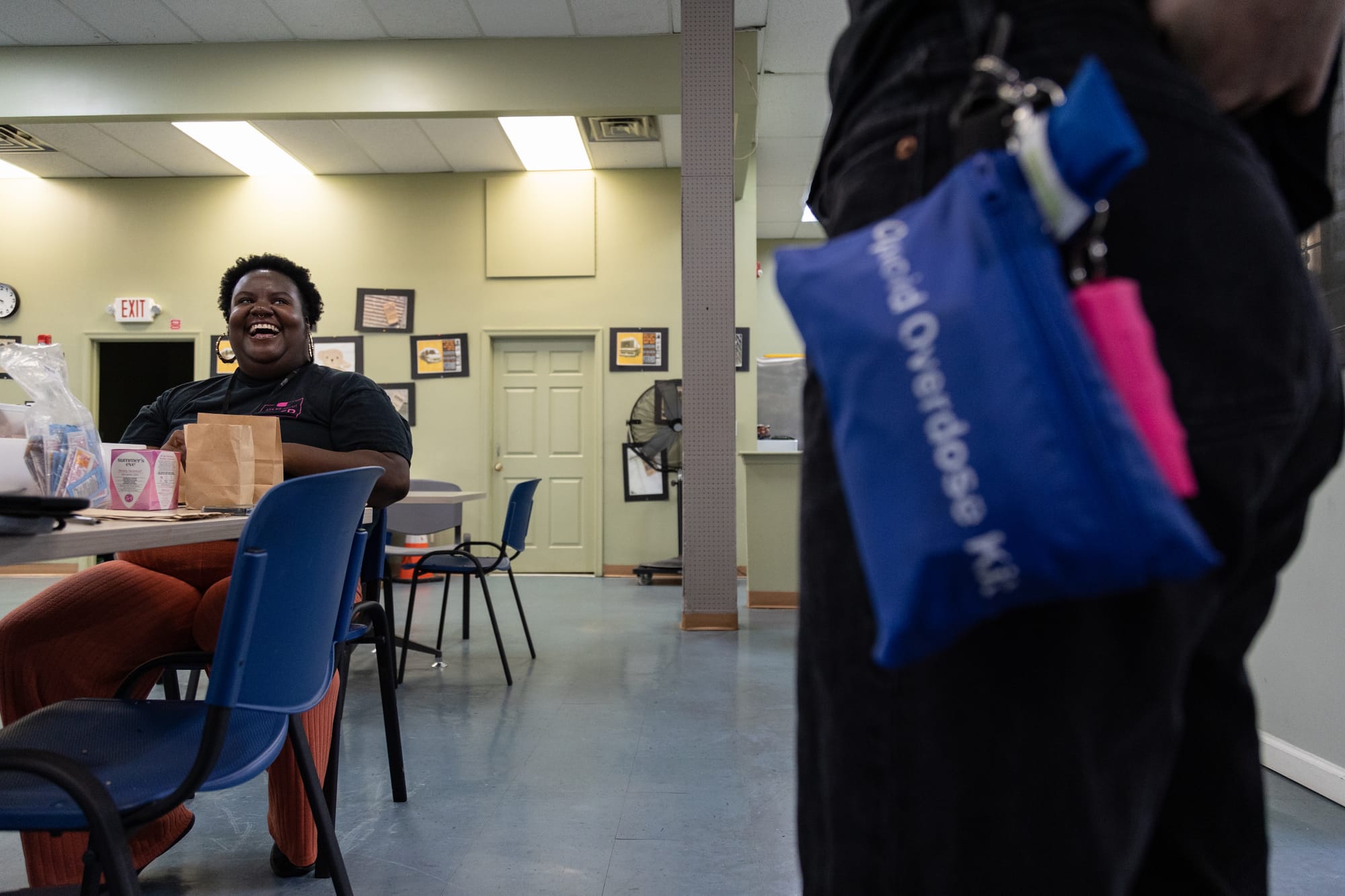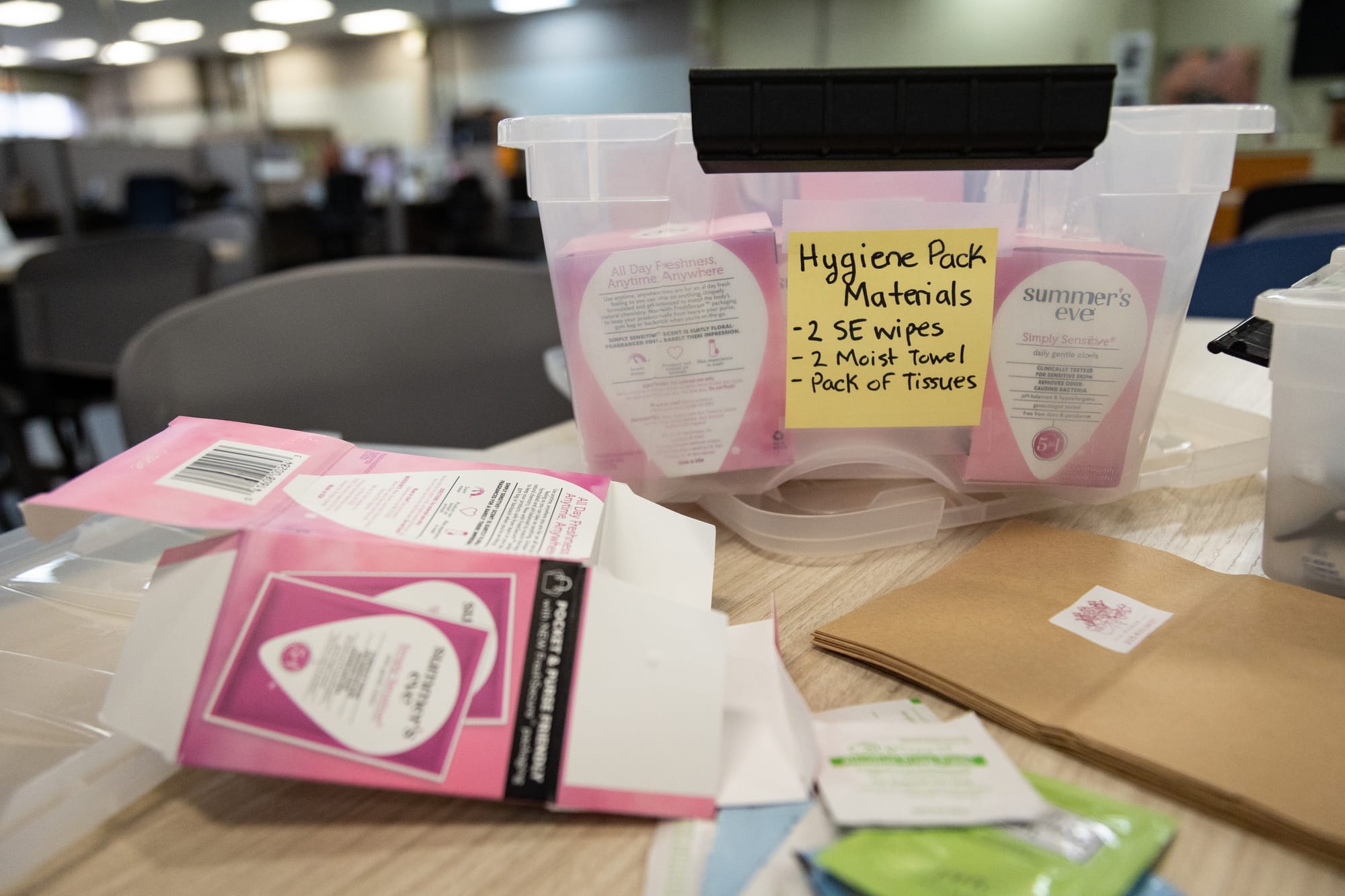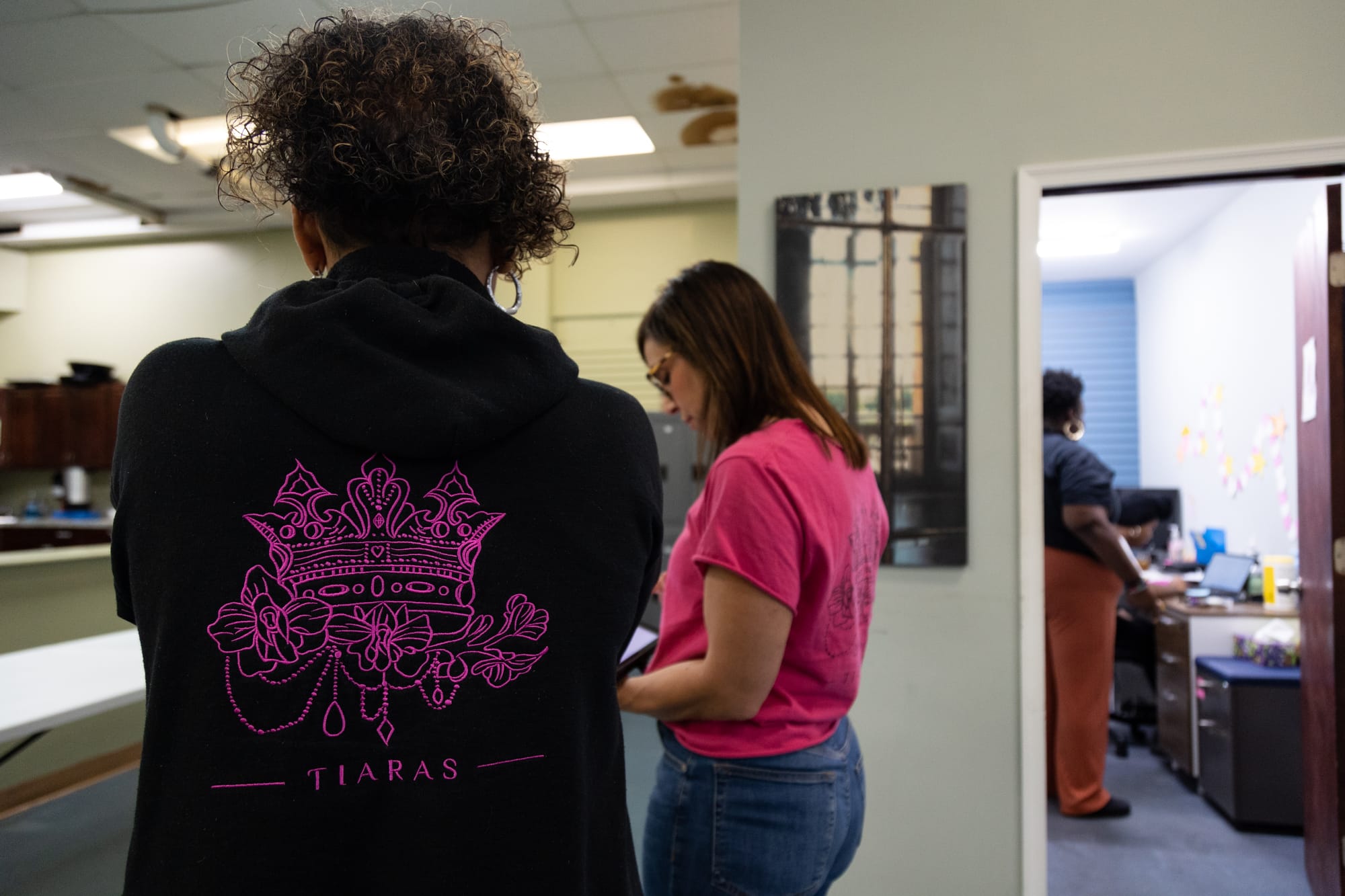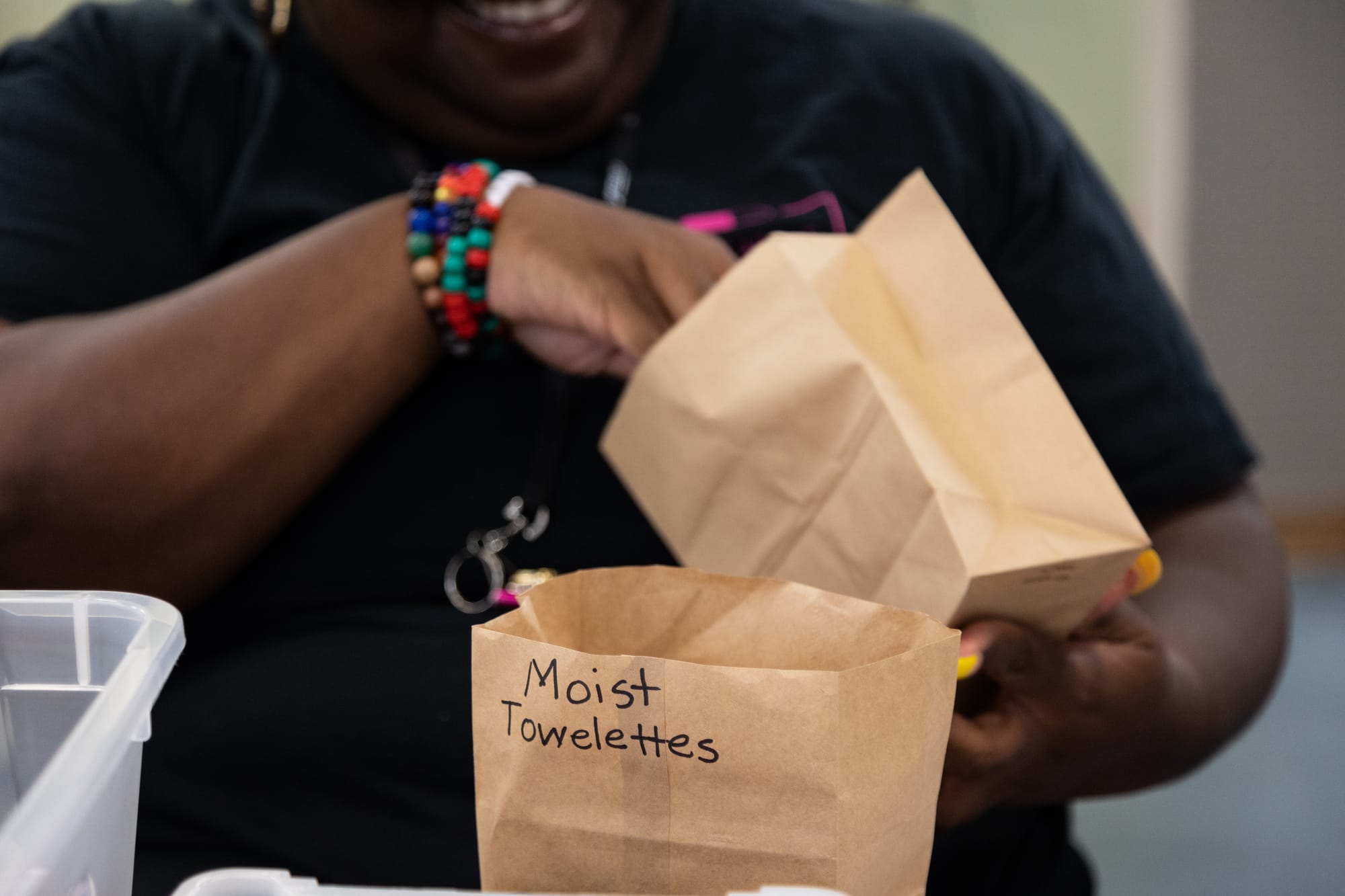Disclosure: Kensington Voice has partnered with a number of community-based organizations, including Prevention Point. Reporter Sammy Caiola recently volunteered at Prevention Point's Womxn’s Night.
The TIARAS team members are easy to spot around Prevention Point. Their pink tee shirts, marked with a crown logo, distinguish them from other staff at the health and social services organization on Kensington Avenue.
On Wednesdays, the team of research assistants from Drexel University is on site for Womxn’s Night – a weekly meal and social gathering for women who are unhoused, experiencing addiction, or otherwise in need of social services.
About 80 women and nonbinary people come through Womxn’s Night each week to shower, pick up sterile syringes, or participate in art activities. Many take their paper-plated meals to go, but those who sit down often chat with the TIARAS team about getting on the medication PrEP, which reduces someone’s chance of contracting HIV.
TIARAS stands for Trauma-informed Intervention for Affect Regulation, Adherence, and Substance Use. Research assistants began recruiting for the program in 2022 to study whether therapeutic writing exercises and cash incentives help motivate women with a history of drug use to continue taking PrEP and decrease their illicit drug use.
“I think it's empowering for folks who are able to not use something for a few days to be able to say, ‘Oh, look, look what I did,’” said lead researcher and Drexel public health professor Alexis Roth. “Taking a break can lead to more long-term behavioral changes.”

How the study works
The TIARAS program initially partnered with Prevention Point’s HIV clinic to help women with a history of injection drug use sign up for PrEP. They chose Prevention Point as a setting for the study due to its success working with that population, Roth said.
“People struggle with medication and struggle with more traditional systems of care, which is really what makes low-barrier, syringe exchange-based programming so incredibly important for this community,” she said. “Across medications, people do better with treatment when it's based out of these facilities.”
Dr. Jessica Meisner, a University of Pennsylvania infectious disease specialist, helped expand and revamp those services when she opened the Sana Clinic at Prevention Point in 2021. Now Meisner and her staff manage the intake and PrEP prescriptions for people the TIARAS team successfully recruits.
“It is really helping encourage women in the area to get on PrEP,” Meisner said. “[The TIARAS team goes] to Womxn's night, they do street outreach, they check in with people. And so it's giving more of a wraparound care for women to prevent HIV than I think we would otherwise have.”

To be eligible for the study, women must:
- Be HIV negative
- Be over the age of 18
- Be female at birth and currently identify as a woman
- Have/get a prescription for PrEP prescribed by Prevention Point Philadelphia
- Have a history of injection drug use
Women enrolled in the TIARAS study get a cash incentive if their urine tests negative for illicit stimulants or for opioids, excluding buprenorphine, methadone, and other prescribed medications. They also get a small cash incentive for adhering to PrEP. They can choose to stop taking PrEP and remain in the study at any time, Roth said.
The study is a randomized controlled trial, meaning that half of participants engage in an “expressive writing” practice and half participate in a “control condition,” according to Roth. The expressive writing activity entails trained facilitators guiding participants through journaling about traumatic experiences. The control condition involves writing about day-to-day activities.
While research on the impact of expressive writing on drug use and PrEP adherence is limited, a 2020 pilot study looked at a similar expressive writing intervention among HIV-positive women with cocaine use disorder symptoms.
The 2020 study found that those exposed to expressive writing had lower rates of cocaine use at three and six months following the intervention. However, the sample size was very small, with only 13 participants at three months and 12 participants at six months after the intervention.
So far, the TIARAS program has enrolled about 110 women and is still recruiting.

Research-informed practice
Prevention Point clinicians used to only prescribe the pill form of PrEP, which cisgender women must take daily, according to current guidelines. Taking a daily medication was difficult for some of Prevention Point’s clients, Roth said. She and various university researchers surveyed 23 women at Prevention Point about their interest in PrEP and the challenges they faced with using it.
“Medications were getting lost or stolen, or people didn't have a discrete place to take them,” Roth said.
Prevention Point began offering the injectable version PrEP in 2022, which is administered less frequently. For the first two months of treatment, it is administered once a month. Then it’s administered once every two months thereafter for as long as someone remains at risk of contracting HIV.
Since Prevention Point began offering injectable PrEP, 90% of women have been choosing the injection over the pill, according to Roth. The TIARAS study is also looking at which form of PrEP women in Kensington choose, she said.
“We're really interested in why women are choosing to stop their PrEP, and also why women are switching between formulations,” said Roth, who believes her team is the first to track that data “in a real world setting.”

Injectable PrEP got FDA approval in 2021, and its oral form was approved in 2016. Oral PrEP was initially marketed heavily to men who have sex with men.
Women accounted for 18% of new HIV cases nationally in 2021, and just over half of women diagnosed with new cases were Black, according to the U.S Department of Health and Human Services. However, women represented just 5% of PrEP users in 2020, according to research from the Yale School of Public Health.
Women living on and around Kensington Avenue are at high risk for HIV due to injection drug use, sexual violence and survival sex work, Roth said.
“I have a vested interest in looking at the impact on women,” she said. “We know in these different clusters and outbreaks that we've seen across the U.S. that women have been disproportionately impacted.”
The benefits of participating in the study can go beyond HIV prevention, said TIARAS research assistant Katie Ward. She’s seen study participants benefit from wound care, housing connections and drug treatment they accessed through Prevention Point, and she’d like to see more of it, she said.
“When somebody can feel stably homed and have that space, their health improves exponentially,” Ward said. “So it’s these larger policy changes we’d need to see on many different levels.”

An uncertain future
Earlier this year, the city advised Prevention Point that it needs to obtain a zoning exemption to continue providing medical care at its location – which they’ve been providing since 2015 without the proper zoning permit, according to Michael Phillips, an attorney for Prevention Point. While the syringe exchange program is allowed to continue, medical services – including those offered by the TIARAS program – could be interrupted if the city declines the zoning request.
A Kensington civic group called Somerset Neighbors for Better Living voted earlier this month against Prevention Point getting the zoning exemption. Next, the city’s Zoning Board of Adjustment will consider community input when they make their decision.
Prevention Point requested to postpone the hearing “to continue our dialogue with the community and to hold another public meeting,” wrote spokesperson Cari Feiler Bender in an email. The hearing was originally scheduled for July 17 but the zoning board recently granted them an extension.

Roth said she’s “very worried” about the potential outcome.
“As a professor of public health, I really hope the zoning board grants Prevention Point the exception,” she said. “Beyond individual health, their programs to test, prevent, and treat infectious diseases like Hepatitis C and HIV help keep our city residents safer by reducing the likelihood of transmission from one person to another.”
Meisner also emphasized the importance of Prevention Point’s medical services.
“The medical side of things is definitely reducing the risk of HIV in the area,” said Meisner. “...Our syringe exchange program pulls in many, many syringes and gives out new syringes, and that also reduces the risk of transmitting HIV or other viral infections”
Syringe services programs reduce HIV and Hepatitis C spread and serve as a bridge to substance use treatment and other health services, according to the U.S. Centers for Disease Control and Prevention.
Prevention Point has already had to cut down the number of sterile syringes it distributes in response to Mayor Cherelle Parker pulling city funding for the intervention, staff said
Have any questions, comments, or concerns about this story? Send an email to editors@kensingtonvoice.com.





